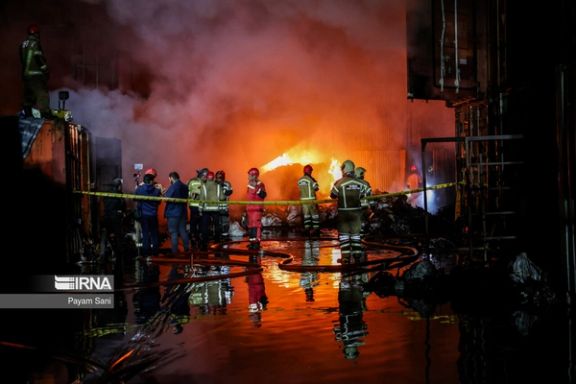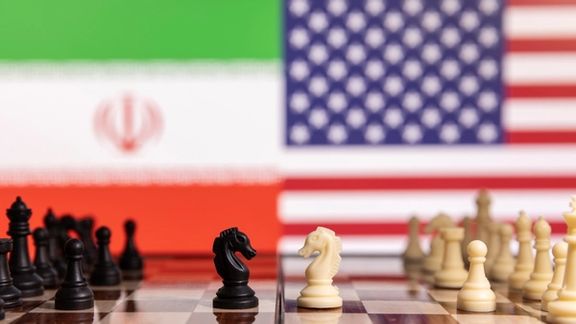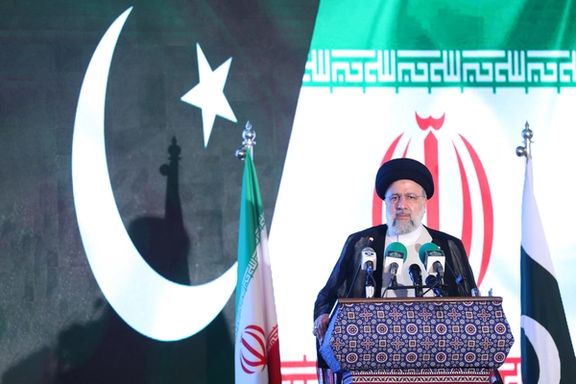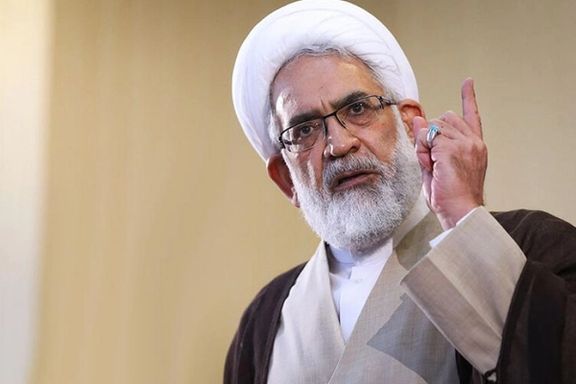Large Fire In Tehran Warehouse Sparks Safety Concerns

A large fire in a warehouse complex in southern Tehran has reignited longstanding concerns over building safety and sparked protests from the city’s fire department.

A large fire in a warehouse complex in southern Tehran has reignited longstanding concerns over building safety and sparked protests from the city’s fire department.
Jalal Maleki, the spokesperson for the Tehran Fire and Safety Services Organization, reported on Thursday that the blaze affected several large warehouses, each approximately 500 square meters in size, with an adjoining open space of about a thousand square meters also engulfed in flames.
Despite the intensity of the fire, which nearly caused the warehouse roof to collapse and damaged several containers, there were no casualties or fatalities reported.
Following the incident, Gholamreza Mohammadi, CEO of the Tehran Fire and Safety Services Organization, emphasized the ongoing challenges faced by firefighters due to restrictive laws that prevent them from entering buildings without owner permission to conduct safety inspections.
In response, the organization is calling for legislative changes to empower firefighters as authorized officers to enforce safety measures without needing owner consent. If enacted, the laws would allow the fire department to seal buildings that fail to comply with safety requests.
The incident highlights a broader issue of safety negligence, particularly in Tehran, where unsafe buildings continue to pose significant risks.
Earlier, Mehdi Pirhadi, a member of the Tehran City Council, highlighted a report identifying 35,000 unsafe buildings in the city, underscoring the urgency of addressing such hazards.
The fire department has frequently protested the high percentage of government buildings that are deemed unsafe, with previous statements indicating that up to 50% of such structures pose safety risks.
The recent fire serves as a critical reminder of the need for comprehensive safety reforms to protect lives and property in Iran’s capital.

On April 24, 2024, the US government took a significant step against corruption in Iran by implementing the Holding Iranian Leaders Accountable Act to enhance oversight of the finances of Iranian officials.
This legislation is part of the National Security Act of 2024, an appropriations bill passed by the 118th Congress and signed into law by President Biden.
The bill includes four key Iran-related measures: the Mahsa Act, the Ship Act, the Iran-China Energy Sanctions Act, and the Holding Iranian Leaders Accountable Act.
Although it has received comparatively less media attention, this article will explore the specifics of the Holding Iranian Leaders Accountable Act, examining its implications and the detailed measures it proposes to address critical issues related to Iran.
Here are the "12 Points You Need to Know" about the "Holding Iranian Leaders Accountable Act of 2023" with detailed insights into the bill's provisions:
1. What does the "Holding Iranian Leaders Accountable Act of 2023" do?
The law mandates reporting requirements for the Secretary of the Treasury to compile detailed reports on financial institutions' dealings with designated Iranian officials, including descriptions of asset holding, acquisitions, and ties to financial institutions, asset descriptions, acquisitions, usage, and involved financial institutions.
It imposes restrictions requiring US and foreign financial institutions identified in the reports to terminate accounts and halt significant financial services to the designated Iranian officials.
2. What is the primary objective of the "Holding Iranian Leaders Accountable Act of 2023"?
The bill seeks greater oversight and reports on the financial activities of key Iranian officials and institutions, aiming to monitor and prevent corruption through funding flows that might support activities like terrorism.
3. Who are the specific individuals and groups named in the bill?
The bill targets key figures within the Iranian government and military, including the Supreme Leader, the President, members of the Guardian Council and the Expediency Council, and high-ranking officials within the Islamic Revolutionary Guard Corps (IRGC) and leaders of major terrorist/proxy groups tied to Iran like Hezbollah and Hamas.
4. Why are these particular individuals and groups targeted?
These figures are central in Iran's political, military, and economic system and are involved in corruption and supporting terrorism, thereby undermining regional stability.
5. Who needs to report under this bill, and what must be reported?
The Secretary of the Treasury must submit comprehensive reports detailing assets, financial transactions, acquisition methods, and uses of funds associated with specified Iranian officials and institutions.
6. How frequently must these reports be prepared and submitted?
An initial report is due within 180 days after the bill's enactment, with subsequent updates every two years.
7. What actions must US financial institutions take under this bill?
US financial institutions are required to close accounts and cease significant financial services for listed individuals and entities.
8. Are foreign financial institutions also affected by this bill?
Yes, the bill compels the Treasury to use all necessary means, under existing laws, to close foreign accounts and stop financial services for identified individuals and entities.
9. What are the provisions for public availability of the report?
The unclassified part of the report should be made public in English, Persian, Arabic and Azari if deemed in the US national interest, enhancing transparency and deterring illicit activities.
10. What are the exceptions and waivers included in the bill?
The President may waive specific requirements if the individuals or institutions prove their funds were legally obtained or if they are cooperating with US security or law enforcement. Transactions involving humanitarian aid to Iran are also exempted.
11. When does the bill expire?
The act includes a sunset clause, ceasing its provisions five years post-enactment unless extended by further legislative action. This allows for reassessment of its effectiveness and relevance.
12. Why does this bill matter?
This law provides an opportunity to increase transparency on the financial resources of the senior leaders in the Islamic Republic and offer additional targets for sanctions. Exposing the corruption of regime officials not only aids in accountability and can embarrass these leaders publicly, but it can further encourage Iranian dissidents and protestors who are facing severe economic difficulties due to regime mismanagement, graft, and corruption.

The awarding of an honorary doctorate from Karachi University in Pakistan to Iranian President Ebrahim Raisi has sparked criticism within Iran, contrasting with the positive portrayal of the event by government media.
The Iranian state news agency, IRNA, claimed that Karachi University, recognized as the largest and one of the most prestigious universities in Pakistan, has granted the honorary title to President Raisi.
The ceremony and its protocols, however, were not without detractors. Mostafa Mirsalim, a hardliner lawmaker, expressed his disapproval on the social media platform X. Mirsalim questioned the dignity of the proceedings, criticizing the decision to have a university deputy, rather than a more senior official, present the degree. His comments underscored a broader concern regarding the respect and honor accorded to the Iranian president during foreign engagements.
The award has also reignited discussions about President Raisi's educational background. During the first presidential debate in 2021, rival candidate Mohsen Mehr-Alizadeh highlighted Raisi's limited formal education, noting that he only completed up to the sixth grade in a standard school setting and then was trained in a Shiite seminary.
Raisi claims he pursued religious studies, although not at the main seminary centers of Qom or Mashhad, and his academic credentials in religious education have been subjects of political scrutiny.
Supporters of President Raisi continue to refer to him as "Dr. Ayatollah."
Meanwhile, debates persist over the validity and appropriateness of such honors and the implications they hold for diplomatic traditions on international stages.

The global outcry against the death sentence of Iranian rapper Toomaj Salehi is gaining momentum, with Australia now adding its voice to the condemnation, joining the US, France, Canada, and Italy.
Earlier this week, an Iranian revolutionary court sentenced the 33-year-old dissident artist to death for charges connected to the 2022 nationwide protests that his lawyer says he had been acquitted of previously. Toomaj's action that solicited the wrath of the authorities was a song in support of the protesters.
Salehi, dubbed "the world's bravest rapper" by Western media, has a 20-day appeal period. According to his lawyer, Amir Raeisian, he intends to appeal the decision.
Australia is raising concerns directly with Iranian officials over the death sentence, a Department of Foreign Affairs and Trade spokesperson told Iran International on Friday.
“Australia condemns Iran’s increasing use of the death penalty, including against political opponents, juvenile offenders, and members of religious and ethnic minorities,” reads the letter addressed to Iran International. “Australia will continue to raise these concerns directly with Iran's representative in Canberra, through our Embassy in Tehran, and in multilateral forums.”
Australian senator David Shoebridge, who sponsors Salehi, also told Iran International that “governments around the world should respond” because the verdict is political in nature.
Since the 2022 protests and mass arrests in Iran, politicians in Europe, Canada and Australia have sponsored many Iranian prisoners are sponsored by politicians.
Security forces killed 550 people and arrested around 22,000 others from September 2022 to March 2023, among them many celebrities, writers and human rights activists, who had criticized the violence.
These lawmakers' sponsorship indicates their intent to leverage their political influence to raise awareness about the plight of Iranian prisoners among politicians and human rights organizations. Their aim is to prevent Iranian judges from delivering harsh sentences in secret trials.
On Thursday, Canada's Foreign Affairs minister Mélanie Joly wrote on X: “Like Toomaj, many others have been victim to IRGC’s human rights abuses & blatant disregard for human life in pursuit of democratic change.”
“Use of the death penalty to suppress human rights & freedoms is unjustifiable,” she added.
In a statement published on Thursday, the French Foreign Ministry also decried the harsh sentence as “unacceptable.”
“France strongly condemns this verdict, which joins the numerous other death sentences and unjustified executions linked to the fall 2022 protests in Iran”, the statement said.
Since Wednesday, protesters in several cities in Europe and the US, including Bonn, The Hague, Frankfurt, Berlin, Hamburg, Milan, and Washington, have taken to the streets to call on their governments to halt the execution.
According to opposition activist Hamed Esmaeeilion in Canada, there are also plans to demonstrate in support of Salehi this weekend.

Iranian Defense Minister Mohammad Reza Ashtiani said Iran's recent missile attack on Israel was a "limited warning" intended to deter further confrontations without escalating the situation further.
Speaking at the Shanghai Defense Ministers' meeting held in Kazakhstan, he claimed that Iran does not seek war.
"I must emphasize that the Islamic Republic of Iran is not seeking war or an escalation of tensions in the region. Nevertheless, any aggression or miscalculation by enemies will be met with an appropriate and regrettable response."
The minister's remarks come in the wake of a significant military engagement on April 13, when Iran launched over 350 missiles and drones at Israel. The projectiles were mostly intercepted by Israeli air defenses and a US-led coalition. The military action was described by Iran as a retaliation to an alleged Israeli airstrike on the Iranian consulate in Damascus. The airstrike reportedly resulted in the deaths of a senior commander of the Quds Force and several officers.
Israel has not officially accepted responsibility for the attack on the consulate. However, US media outlets such as ABC News and CNN, citing US officials, have attributed the targeting a radar site in Iran, on Israel. The province of Esfahan where the strike occurred is notable for its strategic military significance, including the Natanz underground nuclear facility, which has been the subject of suspected sabotage operations attributed to Israel in the past.
Since 1984, the United States has classified Iran as a state sponsor of terrorism. The designation has been largely due to Iran's external activities, which include backing militant groups.

Iran's prosecutor-general has reiterated the compulsory nature of the hijab, declaring it a legal and religious obligation for everyone in the country, including non-Muslims.
Mohammad Jafar Montazeri added that adherence to the hijab is mandatory for all citizens, reflecting the Islamic regime's stance on enforcing hijab irrespective of individual beliefs.
"Hijab is not merely a religious and cultural symbol but a firmly established legal requirement. All residents, regardless of their religious convictions, must comply with the law as it applies generally within our borders."
His statement comes amidst escalating enforcement in the streets under Project Nour, the government's aggressive campaign to ensure compliance with hijab. The initiative has seen a notable increase in confrontations between government agents and the public, particularly targeting women perceived as non-compliant with the mandatory dress code.
The renewed enforcement push has sparked widespread criticism both domestically and internationally, highlighting concerns over human rights abuses. Reports from Tehran indicate a sharp rise in incidents where law enforcement has extorted money, committed theft, and engaged in harassment under the guise of hijab law enforcement.
International human rights groups, local activists, and numerous citizens have voiced alarm over the measures, denouncing the oppressive tactics employed by the authorities.
Recently, Tehran hosted a rally aimed at protesting against hijab defiance. Despite widespread advertising, these rallies failed to attract significant participation.
Since the death of Mahsa Amini in September 2022, detained by morality police for improper hijab, an increasing number of women have publicly forsaken the hijab, sparking widespread protests across the nation against the Islamic Republic.
Authorities have consistently issued warnings to women to adhere to hijab, threatening penalties for non-compliance. Numerous women have been arrested or summoned, and several businesses have been closed for not enforcing hijab regulations.